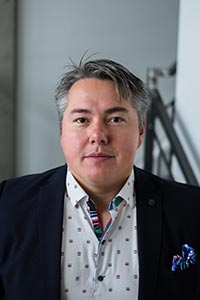A Tale of Wisdom and Engineering
Professional engineer Steven Vaivada sees development longitudinally: he has a vivid picture in his mind of the effect of progress over large spans of time and distance. “I’m very aware of how our development leaves a mark on the land—I can see how things have evolved over time. We can change directions—course-correct on a whim. Personally, I’m very empowered by that.” He’s fuelled by a hope for change and a responsibility to shape outcomes for the land and Indigenous communities.
Vaivada is in a unique position to help such communities thrive. He is Blackfoot, Niitsitapi—a member of the Blood Tribe. He is a wise middleman navigating the touchpoints between business, engineering, and the culture and traditions of Indigenous Peoples to create sustainable, equitable developments.
He explains his parent’s generation were placed in residential schools, and many of his family members currently live on-reserve. He says his father’s career as an engineer served as the fork in the road to make his upbringing different, but the direction and guiding influence in his life both professionally and personally is his heritage. “Being Blackfoot has always given me a sense of purpose and belonging. This is my lived experience.”
A noble responsibility
Starting a business wasn’t on Vaivada’s radar until a good friend pointed out his unique perspective as an engineer and a proud Indigenous person meant he held a responsibility to help. Led by this truth, Vaivada soon left his position with the Government of Canada to launch Scout Engineering & Consulting Ltd., a company that marries Indigenous knowledge with engineering and business principles.
“We have a term, collaborative wisdom, which is a two-way conversation between disciplines to benefit everyone,” explains Vaivada. Scout Engineering partners with companies to deliver projects and help them understand what is possible in terms of Indigenous inclusion, employment, contracting opportunities, equity, and collaborative delivery models.
Scout’s teams engage in trust consulting, helping people understand they’re more alike than different. “Everybody wants to have a more secure and safe future for their children, more opportunities, jobs—to have a happy, healthy existence.” The teams work to create conversations that lead to positive outcomes for Indigenous communities.
A sustainable solution
Vaivada says the challenge is not technical—it’s personal and systemic. “We acknowledge technical expertise is necessary, but the problems facing Indigenous communities are not only technical—they’re a product of the systems and history we have in our country.”
Reservation lands lack internet connectivity, so children struggle with distance learning. Poor electrical infrastructure means spikes and outages, leading to the failure of computers and electrical equipment. Vaivada wants to help fix these infrastructure issues affecting quality of life and access to technology by devising systemic solutions to operating and funding challenges. He also holds true to his responsibility to facilitate employment and training opportunities for those who identify as Indigenous—something he acknowledges is necessary for the long-term success of communities.
Currently Vaivada is working on upstream dam projects to protect the City of Calgary from future flooding and is facilitating the employment of hundreds of tradespeople and workers who identify as Indigenous. He is proud to showcase their high-quality work and expertise, and shatter preconceived notions held about hiring Indigenous professionals and companies.
- Learn more about National Indigenous History Month 2021 on the Government of Alberta website
- Read more about how APEGA members are supporting engineers who identify as Indigenous in: Forging a Path for Future Indigenous Engineers
Featured in this article

Steven Vaivada, P.Eng.
